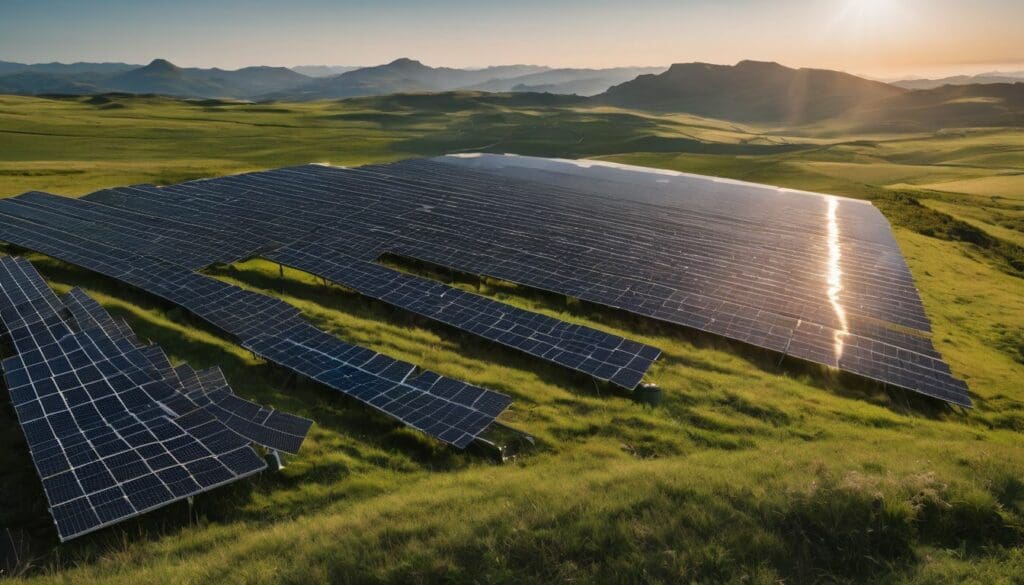Renewable energy startups are challenging the status quo, carving out a new paradigm in an industry long dominated by fossil fuels. With the global demand for energy on an inexorable rise, these innovative ventures are not just nice-to-have; they’re essential to powering a sustainable future.
Drawing from my deep-seated experience in climate tech and renewable solutions, I’ve witnessed firsthand how these startups harness technology and creativity to forge significant strides towards cleaner energy systems.
Their impact is tangible and growing: last year alone, eleven percent of clean technology investment deals bolstered companies from emerging economies, signaling a worldwide shift.
This article will unveil the transformative role of renewable energy startups – those green energy disruptors working tirelessly to illuminate our path to a lower-carbon world. Stay tuned as we explore this bright dawn of innovation!
Key Takeaways
- Renewable energy startups are thriving due to the global demand for sustainable solutions, with financial investments increasing in middle and low-income countries.
- Innovations by these startups, such as blockchain technology and microgrids, are transforming energy systems, particularly benefiting remote areas with limited access to traditional power.
- Challenges like securing funding and navigating complex markets are significant but being tackled through collaborations between startups, established companies, governments, and communities.
- The emerging economies present vast market potential for renewable energy ventures supported by favourable policies that encourage clean energy adoption.
- Financial incentives and ambitious renewable targets set by various regions worldwide provide a supportive framework for the growth of clean technology innovations.
The Rise of Renewable Energy Startups
Renewable energy startups are experiencing a surge in growth, driven by the increasing demand for sustainable and clean energy solutions. These startups are playing a pivotal role in transforming the traditional energy landscape and accelerating the transition towards renewable power.
Key factors driving the growth of startups in the renewable energy sector
Renewable energy startups are emerging as major players in the ongoing transition towards a cleaner future. Their growth is largely due to several key factors that encourage innovation and development in the sector.
- Global demand for energy continues to rise, leading to an urgent search for sustainable solutions. This pushes entrepreneurs and investors towards startups that offer innovative technologies in renewable energy.
- Cutting-edge ClimateTech advancements empower these startups to challenge traditional energy systems, offering more efficient and eco-friendly alternatives.
- Financial incentives and investments are increasingly directed towards sustainable ventures. In 2019-20, a noticeable portion of deals were secured by startups from middle and low-income countries, showing a broadening interest in different markets.
- Government policies across the world are starting to favour clean energy initiatives, creating a more conducive environment for renewable sector businesses to thrive.
- Public awareness around climate change has soared. A growing number of environmentally conscious individuals support companies that contribute positively to conservation efforts.
- Technological breakthroughs in energy storage solutions mean that power generated from renewable sources can be stored more effectively than ever before, increasing the reliability and appeal of these technologies.
- Surging recognition of the need for decentralised power generation leads to greater acceptance of microgrids and blockchain-based solutions provided by innovative ventures.
- With traditional fossil fuels dominating till 2050, there’s an opportunity gap for alternative energy startups to fill with cleaner options as societies push towards a sustainable world without compromising on their energy needs.
Advantages of startups in the energy transition
Startups in the energy transition bring fresh perspectives, agility, and innovative solutions to the renewable energy landscape. These ventures are at the forefront of developing and deploying cutting-edge technologies that drive sustainability and disrupt traditional energy systems.
With a focus on clean energy revolution, climateTech startups position themselves as pioneers in tapping geothermal resources, advanced energy storage solutions, and paradigm shifts in the industry.
By leveraging blockchain technology and microgrid solutions for remote areas, these ecofriendly energy firms are instrumental in transforming the sustainable energy landscape.
Furthermore, sustainable energy companies have become vital players in addressing urgent needs for alternative energy solutions amidst unprecedented global concerns about conventional power generation.
Innovations in Renewable Energy Technologies
Renewable energy startups are embracing innovative technologies such as blockchain, big data, and microgrid solutions to revolutionise the energy landscape. These advancements in technology not only enhance the efficiency of renewable energy systems but also pave the way for sustainable energy solutions in remote areas.
Use of blockchain technology
Blockchain technology is revolutionising the renewable energy sector, offering transparent and secure systems for energy transactions. Startups are utilising blockchain to create peer-to-peer energy trading platforms, enabling consumers to directly buy and sell renewable energy.
This innovative approach empowers individuals and communities to participate in the green energy movement while promoting sustainable practices. Furthermore, blockchain enhances traceability in the renewable energy supply chain, ensuring that clean energy sources are accurately accounted for and utilised efficiently.
The implementation of blockchain technology in renewable energy not only strengthens transparency but also fosters trust among stakeholders. By leveraging this decentralised ledger system, startups can streamline operations and reduce administrative costs, ultimately driving the transition towards a more sustainable and eco-friendly energy landscape.
Leveraging big data
Renewable energy startups are harnessing the power of big data to optimise energy production and consumption. Through advanced analytics, they can identify patterns in energy usage, monitor equipment performance, and forecast renewable energy generation more accurately.
This helps in maximising efficiency and reducing operational costs while ensuring a sustainable and reliable energy supply. By leveraging big data, these startups are driving innovation and revolutionising the way renewable energy is harnessed, making significant strides towards a cleaner, more sustainable future.
Utilising sophisticated data analysis tools allows startups to gain valuable insights into consumer behaviour, market trends, and environmental impact. With this information at their fingertips, they can make informed decisions about resource allocation, infrastructure development, and implementation of smart grid technology – ultimately shaping a more efficient renewable energy landscape for the planet’s well-being.
Microgrid solutions for remote areas
Geothermal start-ups are pioneering microgrid solutions for remote areas, providing sustainable energy access to off-grid communities. Earth’s heat tapping technologies enable the creation of microgrids that can operate independently from centralised power systems.
These innovative renewable energy ventures offer a reliable and cost-effective alternative for regions with limited access to traditional electricity infrastructure. By leveraging the Earth’s heat and embracing decentralised energy generation, these clean energy start-ups contribute to reshaping the sustainable energy landscape in remote areas.
Studies show that sustainable energy start-ups implementing microgrid solutions witness significant positive impacts on environmental conservation and community well-being. As alternative energy ventures continue to innovate in this space, they play a crucial role in addressing the urgent need for alternative energy solutions in remote locations.
Advancements in energy storage
Following the innovations in microgrid solutions for remote areas, advancements in energy storage have become a focal point of renewable energy development. With an increasing focus on sustainable energy landscape transformation, the need for efficient and reliable energy storage technologies has gained prominence.
Startups are leveraging cutting-edge advancements to address the challenges associated with renewable energy sources’ intermittent nature and ensure consistent power supply.
The demand for scalable and cost-effective energy storage solutions is on the rise, offering promising opportunities for startups to revolutionise how we store and utilise renewable electricity.
Implementation of smart meters
Smart meters, which track energy usage in real-time and communicate this information to utility companies, are revolutionising the way energy is managed. These devices enable consumers to monitor their energy consumption more effectively, helping them make informed decisions about when and how they use electricity.
Additionally, smart meters aid in identifying potential areas for energy conservation and efficiency improvements in households or businesses. With the installation of smart meters becoming more widespread, individuals have greater control over their energy usage while also contributing to a reduction in carbon emissions.
Furthermore, the implementation of smart meters aligns with the push towards sustainable practices and environmental conservation. By providing accurate data on energy consumption patterns across various time periods, these devices empower users to make conscious choices that support green initiatives.
Challenges Faced by Renewable Energy Startups
Renewable energy startups face significant challenges in securing funding, navigating complex markets, and overcoming barriers to adoption. However, they continue to drive innovation and disrupt the traditional energy landscape.
Securing funding
To thrive in the competitive renewable energy landscape, startups need substantial financial support to develop and deploy cutting-edge technologies. Studies reveal that funding challenges are a significant barrier for these green technology companies.
In 2019-20, only eleven percent of investment deals for clean energy technology startups were secured by firms from middle and low-income countries, highlighting the struggle for inclusive access to funding.
As demand for sustainable energy solutions continues to grow globally, securing adequate financing is essential to drive innovation and scale up impact across diverse regions.
In the quest for a more sustainable future, environmentally conscious individuals can play a pivotal role in supporting the growth of renewable energy startups through direct or indirect investments.
Navigating the complex market
Renewable energy startups face the challenge of navigating a complex market due to various factors such as regulatory hurdles, evolving technology, and competition from established players.
With fossil fuels currently dominating the energy landscape, green technology startups encounter difficulties in gaining traction and securing funding for their innovative solutions.
Additionally, disrupted supply chains in a net-zero world present logistical challenges that need to be effectively addressed for the industry’s growth. Despite these obstacles, environmentally conscious individuals supporting conservation can contribute to overcoming these challenges by advocating for supportive policies and initiatives aimed at accelerating the transition to renewable energy.
In middle and low-income countries, where sustainable power is crucial but often scarce, 11% of investment deals have been directed towards clean energy technology startups in recent years.
Overcoming barriers to adoption
Navigating the complex market requires startups in the renewable energy sector to anticipate and address significant barriers to adoption. Securing funding remains a key challenge for new entrants, hindering their ability to scale up innovations and technologies.
Additionally, disrupted supply chains in a net-zero world pose logistical challenges for renewable energy development. However, by leveraging partnerships with traditional energy companies and implementing resilient business models that adapt to evolving market dynamics, startups can overcome these obstacles.
Furthermore, middle and low-income countries are increasingly becoming hotspots for investment deals related to clean energy technology startups, indicating growing opportunities despite the challenges.
Collaboration and Partnerships: Driving Innovation in the Startup Ecosystem
Collaboration and partnerships play a crucial role in scaling renewable energy solutions, with startup innovations impacting traditional energy companies. This creates an opportunity for synergy between established players and disruptive startups to drive innovation in the energy ecosystem.
Role of partnerships in scaling renewable energy solutions
Partnerships play a crucial role in expanding renewable energy solutions, harnessing the strengths of diverse stakeholders to drive innovation and scale impact. Collaborative efforts between startups, traditional energy companies, governments, and local communities are vital for overcoming financial barriers and navigating the complex market.
Studies reveal that 11% of investment deals for clean energy technology startups were in middle and low-income countries, highlighting the importance of global partnerships in driving sustainable energy growth.
Furthermore, by leveraging expertise from various sectors through partnerships, renewable energy startups can effectively address challenges such as disrupted supply chains and space constraints to advance towards a more resilient and sustainable future.
Renewable energy alliances not only contribute to technological advancements but also foster an environment conducive to rapid adoption and deployment of innovative solutions worldwide.
These collaborations have been instrumental in addressing issues within renewable energy supply chains while propelling environmentally conscious initiatives forward on a global scale.
Impact of startup innovations on traditional energy companies
Renewable energy start-ups are reshaping the traditional energy landscape, challenging established companies to adapt or be left behind. These start-ups are pioneering innovative technologies and business models that prioritise sustainability and environmental conservation.
Their disruptive impact is compelling traditional energy companies to re-evaluate their practices and invest in renewable solutions. This paradigm shift is pushing the industry towards a more sustainable future, with opportunities for collaboration between start-ups and established players to drive further innovation in the energy sector.
As these start-ups continue to gain momentum, traditional energy companies will need to embrace change by integrating renewable technologies into their operations or risk being overshadowed by more agile and environmentally conscious competitors.
The Road Ahead: Future Trends and Opportunities for Renewable Energy Startups
Renewable energy startups have promising future opportunities in different regions, driven by market potential and supportive policies and initiatives. Adaptability and resilience will be crucial for navigating the evolving energy landscape.
Market potential in different regions
Renewable energy startups have vast market potential in various regions globally.
- Emerging economies, such as India and Brazil, offer immense opportunities for renewable energy startups due to growing populations and increasing energy demands, creating a need for sustainable solutions.
- European countries like Germany and the UK have robust policies promoting renewable energy adoption, making them attractive markets for startups to introduce innovative technologies and solutions.
- In the United States, states with ambitious renewable energy targets, such as California and Texas, present significant opportunities for startups to contribute to the transition towards clean energy.
- African nations with abundant natural resources like solar and wind hold potential for renewable energy startups to address energy access challenges and contribute to sustainable development.
- Southeast Asia’s rapidly developing economies like Vietnam and Indonesia provide a promising market for renewables, driven by concerns about air pollution and climate change impacts.
- The Middle East presents an opportunity for startups specialising in solar power solutions, given the region’s abundant sunlight and growing interest in diversifying its energy mix.
- South American countries including Chile and Uruguay are embracing renewable technologies, creating favourable conditions for startups to enter these markets with their innovative offerings.
- Australia’s focus on reducing carbon emissions creates an environment conducive to renewable energy startups looking to introduce new technologies and business models in the region.
Policies and initiatives for accelerating the transition to renewable energy
- Offering financial incentives, tax credits, and subsidies for renewable energy projects to attract investment and spur growth in the sector. Studies show that these measures have the potential to drive significant advancements in clean energy technology.
- Setting ambitious renewable energy targets and mandates to increase the share of renewables in the overall energy mix. These targets create a clear roadmap for transitioning away from fossil fuels and towards sustainable alternatives.
- Introducing regulatory frameworks that streamline the integration of renewable energy into existing power grids, ensuring a smooth transition and maximising the efficiency of renewable energy systems.
- Investing in research and development to drive innovation in renewable energy technologies, enhancing efficiency and reducing costs associated with renewable energy production.
- Collaborating with international partners to share best practices, knowledge, and resources in advancing the adoption of renewable energy on a global scale.
Importance of adaptability and resilience
Policies and initiatives for accelerating the transition to renewable energy have highlighted the importance of adaptability and resilience in this sector. As climate change continues to reshape global energy needs, startups must demonstrate the ability to pivot and withstand market challenges.
Renewable energy startups face disruptions in supply chains, requiring them to remain flexible in their operations while building resilient strategies.
The dynamic nature of the renewable energy landscape demands constant adaptation from startups. From overcoming logistical challenges posed by space requirements for renewable energy sites to addressing disrupted supply chains in a net-zero world, adaptability and resilience are crucial for these startups’ survival and success.
Conclusion
In conclusion, renewable energy startups are reshaping the energy landscape with innovative technologies and a focus on sustainability. They are overcoming challenges through collaborations and partnerships to accelerate the transition towards clean energy.
The future holds exciting opportunities for startups in different regions, supported by policies and initiatives promoting adaptability and resilience. With cutting-edge solutions, these startups are driving a paradigm shift in the energy industry, offering hope for a sustainable and environmentally-friendly future.
FAQs
1. What are renewable energy startups doing to change the energy industry?
Renewable energy startups are causing paradigm shifts in the energy industry by introducing innovative technologies that focus on clean and sustainable power sources.
2. How do these startups contribute to energy innovation?
These startups drive energy innovation through researching and developing new methods and technologies for generating, storing, and distributing renewable energy.
3. Are renewable energy startups making a significant impact?
Yes, these startups play a crucial role in disrupting the traditional landscape of the energy sector by pushing the boundaries of what’s possible with green technology.
4. Can I get involved with a renewable energy startup?
Absolutely! People can engage with renewable energy startups in various ways such as investing in them, using their services or even working for one to help further their mission of transforming the way we consume energy.





